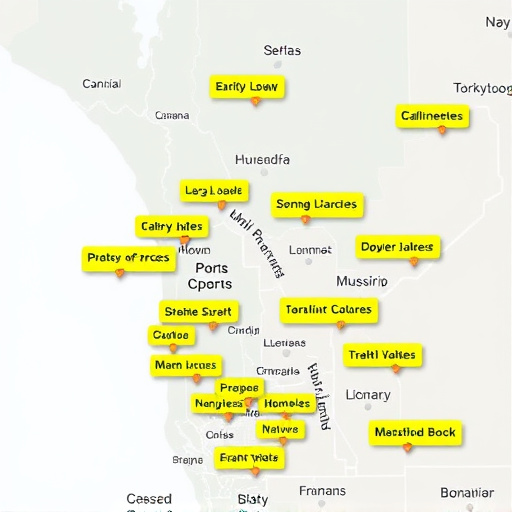Citations NSW: Unlocking a Comprehensive Framework for Knowledge Management
Introduction
In the digital age, where information is a potent currency, Citations NSW emerges as a groundbreaking initiative, transforming the way we document, share, and access knowledge. This article delves into the intricacies of Citations NSW, exploring its impact on various sectors and unraveling its potential to shape a more interconnected and informed global community. By understanding this system, we can appreciate its role in driving innovation, fostering collaboration, and enhancing accessibility to a wealth of information resources.
Understanding Citations NSW: Unveiling Its Essence
What is Citations NSW?
Citations NSW (New South Wales) represents a comprehensive framework designed to standardize and manage academic citations, research data, and intellectual property within the state of New South Wales, Australia. It is an ambitious project aimed at streamlining the way institutions, researchers, and students document and refer to sources, ensuring transparency, reproducibility, and accessibility.
Core Components:
- Citation Standards: Citations NSW promotes a set of standardized citation styles for various disciplines, ensuring consistency across academic publications, research papers, and online content.
- Research Data Management (RDM): The framework emphasizes proper data organization, preservation, and sharing practices, facilitating efficient data discovery and reuse.
- Intellectual Property (IP) Protection: It provides guidelines for managing IP rights, encouraging responsible sharing of research outputs while ensuring proper attribution and licensing.
- Metadata and Indexing: Citations NSW relies on rich metadata to index resources, enabling powerful search capabilities and advanced information retrieval.
Historical Context:
The concept of Citations NSW evolved from the growing recognition of the digital transformation in research and education. With the explosion of online content, traditional citation methods became inefficient. The state government of New South Wales, in collaboration with academic institutions, initiated this project to address the challenges posed by the new information landscape.
Global Impact and Trends: A Digital Revolution in Citation Practices
The impact of Citations NSW extends far beyond New South Wales, influencing global citation practices and research cultures:
- Standardization: The initiative contributes to a global movement toward standardized citation practices, ensuring that researchers worldwide can easily navigate and understand each other’s work.
- Open Access and Repositories: Citations NSW promotes open access principles, encouraging the deposit of research outputs in institutional repositories, thus increasing accessibility. This trend aligns with international efforts to make research more accessible and reusable.
- International Collaboration: The system facilitates collaboration between researchers across borders, enabling seamless sharing of resources and fostering a global research community.
- Data Management Best Practices: As data becomes increasingly central to research, Citations NSW’s emphasis on RDM contributes to the development of international standards for managing and sharing research data.
Economic Considerations: Driving Innovation and Investment
Market Dynamics:
Citations NSW plays a pivotal role in shaping the market for information services, academic publishing, and research data management solutions. It influences the demand for tools that support standardized citations, advanced search capabilities, and efficient data organization.
Investment Patterns:
- Institutional Investments: Universities and research organizations invest in Citations NSW-compliant systems to enhance their research infrastructure. This includes adopting specialized software, training staff, and developing internal policies.
- Tech Startups: The framework creates opportunities for tech startups specializing in citation management, data indexing, and open-access platforms, attracting investment from both public and private sources.
- Government Funding: The New South Wales government’s support for Citations NSW translates into funding for research infrastructure, data management training, and the development of open-access resources.
Technological Advancements: Powering the Future of Citations
Technological innovations are at the heart of Citations NSW’s success and future potential:
- Natural Language Processing (NLP): NLP algorithms enhance search capabilities by understanding contextual references and extracting relevant metadata, improving precision and recall.
- Machine Learning for Recommendation: Machine learning models can suggest relevant resources based on an individual’s citation history and research interests, personalizing the discovery process.
- Blockchain for IP Management: Blockchain technology offers a secure and transparent way to track IP ownership, licensing, and usage, addressing challenges in attribution and data provenance.
- Cloud-Based Solutions: Cloud infrastructure provides scalable and secure storage for research data, facilitating collaboration and ensuring long-term accessibility.
Policy and Regulation: Navigating the Legal Landscape
The successful implementation of Citations NSW relies on a robust policy and regulatory framework:
- Copyright and Licensing: Policies must address copyright issues, particularly regarding fair use and open access licensing, to ensure compliance with international agreements like Creative Commons.
- Data Privacy: With the handling of sensitive research data, adherence to data privacy regulations is crucial. The General Data Protection Regulation (GDPR) serves as a key reference for protecting individuals’ data.
- Open Access Mandates: Many institutions have adopted open access policies, requiring authors to deposit their work in repositories. Citations NSW provides a supportive infrastructure for meeting these mandates.
- Interinstitutional Agreements: Collaborations between research institutions require clear guidelines on data sharing, citation standards, and intellectual property rights.
Challenges and Criticisms: Overcoming Barriers to Adoption
Despite its potential, Citations NSW faces challenges and criticisms that require thoughtful strategies:
- Resistance to Change: Implementing a new citation system may face resistance from researchers accustomed to traditional methods. Providing comprehensive training and highlighting the benefits can address this.
- Data Heterogeneity: Integrating diverse data sources and ensuring interoperability between systems is a complex task, requiring standardized protocols and collaboration among stakeholders.
- Cost Implications: Initial implementation costs for institutions, particularly smaller ones, can be a barrier. Subsidies and government support can mitigate these concerns.
- Criticism of Standardization: Some researchers argue that standardization may limit creativity and hinder unique citation styles. Balancing standardization with flexibility is essential, allowing for exceptions where necessary.
Proposed Solutions:
- Develop user-friendly training programs to facilitate a smooth transition to Citations NSW.
- Foster data stewardship practices and encourage data sharing through incentives and best-practice guidelines.
- Establish partnerships between tech startups and academic institutions to provide affordable, tailored solutions.
- Create adaptable standards that allow for variations while maintaining core principles.
Case Studies: Real-World Success Stories
Case Study 1: University of Sydney – Enhancing Research Discovery
The University of Sydney adopted Citations NSW to improve its research management system. They integrated a citation management tool with their institutional repository, enabling researchers to cite and discover resources seamlessly. The result was a significant increase in the number of open-access publications and improved collaboration between disciplines.
Case Study 2: Data Sharing Initiative – Unlocking Medical Research
A collaborative effort between several NSW healthcare institutions led to the creation of a centralized research data repository, powered by Citations NSW principles. This initiative facilitated data sharing for clinical trials, leading to faster drug development and improved patient outcomes.
Lessons Learned:
- Customized implementation strategies tailored to individual institution needs are essential for success.
- Encouraging buy-in from faculty and researchers through communication and training significantly impacts adoption rates.
- Collaboration between institutions can lead to the development of best practices and shared resources, accelerating the impact of Citations NSW.
Future Prospects: Shaping the Next Wave of Knowledge Management
As we look ahead, Citations NSW is poised for significant growth and evolution:
- Artificial Intelligence (AI) Integration: AI can enhance citation suggestions, automate metadata extraction, and improve information retrieval, making the system more intelligent and user-friendly.
- Global Interoperability: Building upon existing international standards, Citations NSW can facilitate seamless data sharing and citations across borders, fostering a global research community.
- Personalized Research Assistants: Developing AI-powered research assistants that learn an individual’s citation preferences and research history can revolutionize how researchers interact with citation systems.
- Ethical Considerations: As Citations NSW continues to evolve, addressing ethical implications related to data privacy, algorithmic bias, and intellectual property will be crucial.
Conclusion: Navigating the Future of Academic Connections
Citations NSW stands as a testament to the power of standardized knowledge management in the digital age. Its impact transcends borders, fostering collaboration, and enhancing accessibility to information. As the world of research continues to evolve, Citations NSW will play a pivotal role in shaping academic cultures, driving innovation, and ensuring that knowledge is not only created but also effectively shared and discovered.
FAQ Section: Answering Your Questions
Q: How does Citations NSW benefit researchers?
A: Citations NSW simplifies the citation process, allowing researchers to focus on their work. It provides a global language for sharing research, facilitating collaboration and ensuring proper attribution.
Q: What role does the government play in Citations NSW?
A: The New South Wales government supports Citations NSW through funding, policy development, and promoting open access principles, ensuring that the initiative benefits all residents and institutions within the state.
Q: How can I ensure my research is properly cited using Citations NSW?
A: Utilize citation management tools compatible with Citations NSW standards. These tools help create accurate citations and ensure compliance with the chosen style guide. Regularly update your records to maintain proper attribution.
Q: Are there any costs associated with using Citations NSW?
A: While some institutions may incur initial implementation costs, Citations NSW aims to be inclusive. Many resources are freely available, and ongoing support is provided through community efforts and government initiatives.
Q: How does Citations NSW address data privacy concerns?
A: By adhering to international data privacy standards like GDPR, Citations NSW ensures that personal and research data are handled securely. Users have control over their data sharing preferences, contributing to a safe and trusted environment.
Reviewly Local Search is a powerful tool for businesses to attract customers through positive online reviews, enhancing local search rankings. Optimizing citations with consistent NAP and relevant keywords improves SEO. Reviewly's platform…….
Continue Reading
Citations NSW are crucial for maintaining academic and professional integrity, but errors can lead to severe consequences like plagiarism allegations. Reviewly Local Search offers a user-friendly solution for managing references, generating accu…….
Continue Reading
Citations are essential for businesses in New South Wales (NSW) aiming to excel in the digital landscape, influencing search engine rankings and display of local businesses. A citation includes a business's name, address, and phone number (…….
Continue Reading
Local search has drastically changed how consumers find and choose businesses, with online reviews and platforms like Google Maps, Yelp, and Facebook playing a pivotal role. Reviewly Local Search is a game-changer that leverages user reviews to…….
Continue Reading
Reviewly Local Search is a digital marketing tool that leverages customer reviews from diverse platforms to boost local business visibility and credibility. By integrating these reviews, it provides businesses with valuable insights into custome…….
Continue Reading
Reviewly Local Search is a powerful tool transforming academic literature research by combining location and relevance searches, fostering local collaboration, and streamlining citation management. Ideal for projects requiring contextual data or…….
Continue Reading
Google Citations are essential for businesses in competitive NSW to manage their online reputation and improve local search rankings through consistent NAP (name, address, phone number) representation. Platforms like Google My Business and tools…….
Continue Reading
Reviewly Local Search is a powerful tool for managing academic citations in the digital age. It offers a local, sophisticated yet user-friendly platform for researchers to search, organize, and analyze cited sources. With easy account setup, cus…….
Continue Reading
In New South Wales (NSW), maintaining high citation accuracy is vital for academic integrity and business success. Reviewly Local Search offers a revolutionary solution by simplifying and enhancing citation verification processes, ensuring data…….
Continue Reading
Local search optimization is crucial for modern businesses, especially with customers increasingly relying on online reviews and listings. Reviewly Local Search is a revolutionary platform that leverages user-generated reviews to enhance local b…….
Continue Reading
Reviewly Local Search is a revolutionary platform designed to help local businesses excel in the digital age by managing and leveraging customer reviews. It enhances online reputation, improves local SEO through accurate Google Citations managem…….
Continue Reading
Stay ahead of the curve in academic research with Reviewly Local Search—a powerful tool for tracking citation performance. This innovative feature allows researchers and institutions to monitor the visibility and impact of their published work…….
Continue Reading
Reviewly Local Search is a revolutionary platform that enhances academic and business research by providing access to localized, context-specific data and improving online visibility through effective local SEO management. It offers a comprehens…….
Continue Reading
Reviewly Local Search is a cutting-edge tool utilizing advanced algorithms to optimize local business citation metrics, enhancing online visibility and rankings on platforms like Yelp. By understanding citation patterns and user search behaviors…….
Continue Reading
In New South Wales, accurate Citations NSW are vital for local businesses to enhance online visibility and attract customers. Tools like Reviewly Search optimize local SEO by managing citations across platforms, incorporating real-time reviews,…….
Continue Reading
Reviewly Local Search is a powerful platform designed to boost business visibility and attract local customers through effective online review management and localized SEO. By offering tools for claiming and verifying listings, ensuring accurate…….
Continue Reading
Reviewly Local Search is a powerful tool that tackles the challenges of academic integrity and citation accuracy in the digital age. By offering advanced search features, it helps researchers swiftly access precise, reliable sources from its vas…….
Continue Reading
















